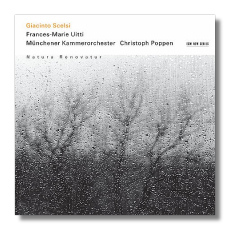
The Internet's Premier Classical Music Source
Related Links
- Scelsi Reviews
- Latest Reviews
- More Reviews
-
By Composer
-
Collections
DVD & Blu-ray
Books
Concert Reviews
Articles/Interviews
Software
Audio
Search Amazon
Recommended Links
Site News
 CD Review
CD Review
Giacinto Scelsi

- Natura renovator
- Ohoi
- Ave Maria
- Anâgâmin
- Ygghur
- Alleluja
Frances-Marie Uitti, cello
Münchener Kammerorchester/Christoph Poppen
ECM New Series 1963 476310-6 DDD 52:08
I've been trying to get a grip on the music of Giacinto Scelsi (1905-1988) for several years now, and I think this ECM New Series release has done it for me. Scelsi was one of the past century's true iconoclasts. Early in his career he was an adherent of 12-tone music, but after World War Two he underwent a breakdown, which led to both a spiritual and a musical transformation. He believed that the composer was a sort of mediator between earthly reality and spiritual transcendence, particularly as it is understood and described in Eastern cultures. As a consequence, his music became more spiritual and rarefied. Indeed, there are works of his that focus on the communicative powers of a single note, modified only by alterations in dynamics, timbre, and tuning.
Nothing quite so extreme is on the present CD, but still, it is a harrowing yet rewarding listening experience that has been served up here. There are three works for solo cello (Ave Maria and Allelujah, both from Three Latin Prayers, and the three-movement Ygghur), and three works for an ensemble of 11 (Anâgâmin, Natura renovatur) or 16 (Ohoi) strings. These works were composed between 1961 and 1970. The absence of the string ensemble works in Scelsi's discography was a lacuna that has been quite excitingly filled (at least in part) by the present release. These works are reminiscent of the late György Ligeti's micropolyphonic compositions for strings, but while Ligeti's music often feels calculated, as if it were an experiment in progress, Scelsi's feels much more intuitive, and more freely assembled. That doesn't mean that the music's construction is haphazard. Indeed, Scelsi took great pains and made many revisions to ensure that the final product was what he wanted it to be. (As his method of writing music was based on improvisation, this is not too surprising.) Some listeners might not even recognize these droning, buzzing, and hulking works as "music," in the traditional sense, but as an organized and continuously evolving collection of curiosity-provoking sounds that just happen to be created by strings. If a painting by Robert Motherwell could come to life, it might well sound like one of these works.
If Ave Maria and Allelujah are more conventionally tonal than the other works on this CD, it's because they originated as works for voice. (Uitti assisted the composer in transcribing them for cello.) Dedicated to Uitti, Ygghur (the Sanskrit word for "catharsis") is an example of Scelsi's interest in single notes. (This is the third part of a supposedly semi-autobiographical trilogy of works for solo cello.) In this work, the cellist must retune her instrument so that all four strings produce the same note. This opens the door to a tremendous variety of timbral and microtonal variations. The result, perhaps paradoxically, is music that is both spare and riveting in its variety and intensity.
The excellence of Uitti's playing is a given here. Her long-term association with the composer places her in the position of being one of his most authentic interpreters. Poppen's work with the Munich Chamber Orchestra is hardly less impressive. Although the musicians are the ones jumping into Scelsi's lake of purifying fire, the listeners are the ones who come away from the experience changed. Not easy stuff, then, but essential.
The booklet contains essays by Uitti and another ECM New Series recording artist, pianist Herbert Henck. As is often the case with music on this label, it has been recorded in a church. The aptly named "Himmelfahrtskirche" ("Journey to Heaven Church") in Munich has added its own spiritual accent to Scelsi's already spiritual music.
I hope that ECM New Series brings us more music by Scelsi, and soon. In the meantime, get this disc.
Copyright © 2006, Raymond Tuttle




















